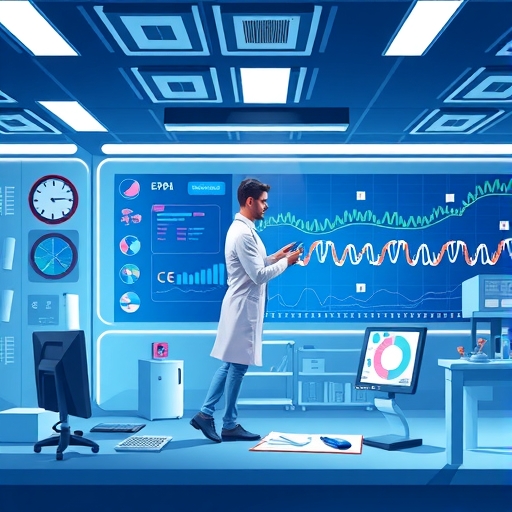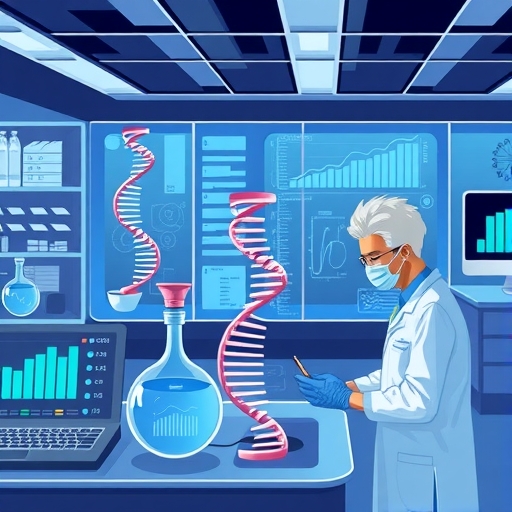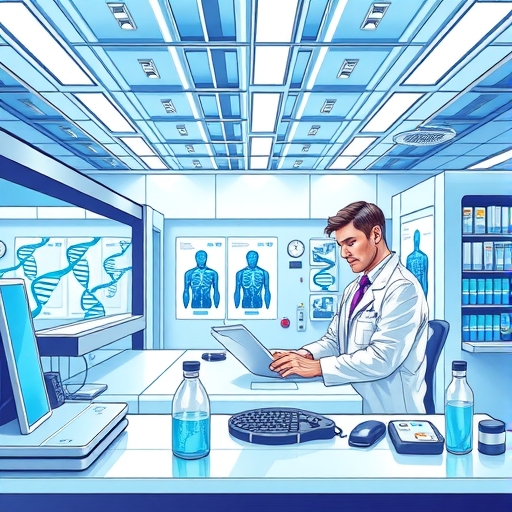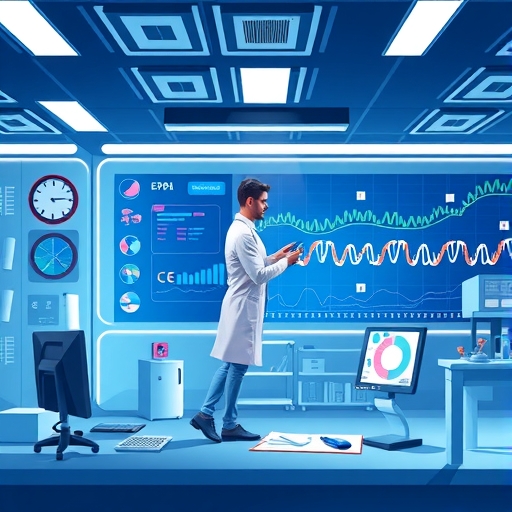Unlocking the Future of Medicine: Ali Urman and ARK Invest’s Vision for the Genomics Revolution
Welcome, aspiring investors and seasoned traders, to an exploration of one of the most profound technological transformations of our era: the Genomics Revolution. We are standing at the precipice of a medical paradigm shift, driven by the remarkable convergence of DNA sequencing, artificial intelligence (AI), and groundbreaking gene editing technologies. To truly grasp the immense investment potential and societal impact of this revolution, we must turn our attention to the visionary leaders who are not just observing this change, but actively funding it. At the forefront of this movement is Ali Urman, a distinguished Genomics Analyst and investor at ARK Invest, whose unique blend of scientific expertise and investment acumen is charting the course for the future of healthcare.
Imagine a world where genetic diseases are not merely managed but functionally cured, where cancer treatments are precisely tailored to an individual’s unique biological makeup, and where healthcare shifts decisively from reaction to prevention. This is the future that the Genomics Revolution promises, and it is the very frontier that Ali Urman and her colleagues at ARK Invest are meticulously exploring. Our goal today is to demystify these complex concepts, providing you with a clear, comprehensive understanding of the forces at play and how you, too, can begin to comprehend the investment landscape being shaped by these incredible advancements. Let us embark on this enlightening journey together.

- DNA sequencing plays a crucial role in understanding genetic diseases.
- Artificial Intelligence enhances the analysis of genetic data.
- Gene editing tools provide innovative solutions for treating genetic disorders.
Ali Urman: A Unique Blend of Science and Strategy at ARK Invest
To truly appreciate the depth of ARK Invest‘s approach to the Genomics Revolution, we must first understand the expertise of those leading the charge. Ali Urman is not your typical financial analyst. Her background is a compelling tapestry woven from rigorous scientific research, cutting-edge artificial intelligence development, and strategic consulting. This multidisciplinary foundation provides her with an unparalleled lens through which to identify truly disruptive companies within the biotech sector.
Since joining ARK Invest as a Genomics Analyst and investor in February 2020, Ali Urman has become a pivotal figure in the firm’s Genomic Revolution strategy. Her passion extends across crucial domains, including immunotherapy, gene editing, stem cell therapy, AI in healthcare, and the broader field of public health. How does this passion translate into investment decisions? It means she specializes in pinpointing companies that not only possess rigorous scientific foundations but also demonstrate quantifiable cost decline curves, a principle central to ARK Invest’s disruptive innovation thesis. Think of how the cost of computing power has plummeted over decades; ARK seeks similar exponential declines in biological technologies like DNA sequencing.
Before her tenure at ARK Invest, Ali Urman gained invaluable experience in clinical cancer research at esteemed institutions such as Memorial Sloan Kettering Cancer Center and Montefiore Medical Center. This direct exposure to the front lines of patient care and medical discovery provides her with a profound understanding of unmet medical needs and the potential for new therapeutic approaches. Her transition to the technology sector as a Senior Research Program Manager at IBM Watson Health further broadened her horizons, where she led AI programs like Watson for Oncology, Clinical Trials, and Genomics. This unique blend of clinical and computational experience positions her perfectly to evaluate the complex interplay between biological data, AI algorithms, and real-world medical applications. Beyond her direct work, Ali Urman holds various board and advisory positions, including with Cure Rare Disease, Sanford School of Medicine’s SPARK, Sortium, and The Innovation Foundation, underscoring her commitment to fostering innovation and driving progress across the healthcare ecosystem. Her extensive media presence, numerous publications, and filed patents further solidify her standing as a respected authority in this intricate field.

| Key Expertise Areas | Impact on Investment |
|---|---|
| Immunotherapy | Promising therapeutic avenues for cancer treatment. |
| Gene Editing | Potential to create functional cures for genetic disorders. |
| AI in Healthcare | Improving the efficiency and accuracy of treatment plans. |
ARK Invest’s Distinctive Philosophy: Identifying Disruptive Innovation
At its core, ARK Invest operates with a philosophy deeply rooted in the concept of disruptive innovation. Unlike traditional investment firms that might focus on incremental growth, ARK actively seeks out companies that are fundamentally changing how the world works. Their investment strategy is not about following trends but about identifying the underlying technological forces that will create entirely new markets and revolutionize existing ones. This conviction is vividly embodied in their focus on the Genomics Revolution, encapsulated within the ARK Genomic Revolution ETF (ARKG), a flagship fund designed to capture these transformative opportunities.
ARK’s approach is characterized by a rigorous, collaborative, and remarkably transparent research process. They believe that true insights emerge from diverse perspectives and open dialogue. This is why their weekly brainstorming sessions are not just internal meetings but often involve experts from various fields, fostering a rich intellectual environment. This collaborative spirit extends to their commitment to open-source research, where they frequently publish their models, data, and investment theses for public scrutiny and feedback. This transparency not only builds trust but also invites a broader community of thinkers to contribute to their understanding of complex technological shifts.
When evaluating potential investments, ARK Invest, guided by experts like Ali Urman, looks for specific characteristics. They prioritize companies with undeniable scientific rigor, often validated by academic research and peer review. This ensures that their investments are based on sound scientific principles, not just speculative promises. Furthermore, they seek a clear and quantifiable trajectory for cost decline. This concept, often linked to Wright’s Law, posits that for every cumulative doubling of units produced, costs fall by a constant percentage. In genomics, this is strikingly evident in the plummeting cost of DNA sequencing. By focusing on these two critical criteria—scientific rigor and declining costs—ARK aims to identify companies that are not only scientifically promising but also economically scalable, capable of achieving widespread adoption and significant market impact. This unique, fundamentals-driven approach allows them to navigate the often-volatile biotech markets with a long-term, high-conviction perspective, always with the company mission to help investors realize profit through deep knowledge.
The Foundations of the Genomics Revolution: DNA Sequencing’s Exponential Leap
The very bedrock of the Genomics Revolution is undoubtedly DNA sequencing. It is the fundamental technology that allows us to “read” the genetic code of living organisms, providing unprecedented insights into biology, disease, and health. Consider its astonishing trajectory: the initial Human Genome Project, completed in 2003, took over a decade and cost approximately $1 billion to sequence a single human genome. Today, thanks to incredible advancements in next-generation sequencing technologies, the cost has plummeted to less than $1,000, and in some cases, even hundreds of dollars. This precipitous cost decline, mirroring Moore’s Law for computing, is arguably one of the most significant technological cost reductions in history, and it’s driving massive adoption across various sectors.
What does this dramatic drop in cost mean for healthcare and investment? It means that genomic information, once a prohibitive luxury, is rapidly becoming accessible and routine. ARK Invest forecasts that the demand for sequencing will soar from 2.6 million genomes in 2019 to an astounding 105 million by 2024, reflecting a growing recognition of its utility. This surge in accessibility is unlocking a vast array of applications that are redefining medical practice:
- Precision Medicine: Tailoring medical treatments and interventions to an individual’s unique genetic profile. This moves us away from a one-size-fits-all approach to highly personalized therapies.
- Drug Discovery and Therapeutics: Identifying new drug targets, understanding disease mechanisms, and developing more effective and safer medications based on genetic insights.
- Liquid Biopsies: Detecting cancer or other diseases from a simple blood sample by analyzing circulating tumor DNA, offering less invasive diagnostic and monitoring tools.
- Tumor Profiling: Characterizing the genetic mutations within a patient’s tumor to guide targeted cancer therapies.
- Germline Testing: Identifying inherited genetic predispositions to diseases, allowing for proactive screening and preventative measures.
- Immuno-oncology: Understanding how a patient’s immune system interacts with cancer at a genetic level to develop more effective immunotherapies.
- Prenatal Testing: Non-invasively screening for genetic conditions in fetuses, providing crucial information for expectant parents.
Ali Urman and ARK Invest are particularly bullish on long-read sequencing, which, despite being a newer technology, offers a more comprehensive view of the genome, better capturing complex structural variations. ARK forecasts long-read sequencing revenues to grow at an astonishing annual rate of 82% to $5 billion by 2025, underscoring their conviction in this foundational technology’s power to drive future medical breakthroughs and create significant investment opportunities.

Gene Editing: The Promise of Functional Cures and a New Era of Medicine
While DNA sequencing allows us to read the genetic code, gene editing provides us with the ability to rewrite it. This transformative capability represents a fundamental shift in medicine, moving beyond merely treating symptoms to offering the potential for functional cures for diseases rooted in genetic mutations. Imagine, for a moment, a future where inherited conditions like cystic fibrosis, sickle cell anemia, or Huntington’s disease could be corrected at their source, not just managed throughout a lifetime. This is the profound promise of gene editing, and it’s why it stands as one of the core pillars of the Genomics Revolution.
The landscape of gene editing has evolved rapidly, but the most prominent technology remains CRISPR Cas9. Discovered as a natural defense mechanism in bacteria, CRISPR (Clustered Regularly Interspaced Short Palindromic Repeats) allows scientists to precisely target and cut specific sections of DNA. This “molecular scissor” enables researchers to either disable a faulty gene or insert a healthy one. The advent of CRISPR has dramatically accelerated the pace of genetic research and therapeutic development, making gene editing far more accessible and efficient than previous methods.
Beyond CRISPR Cas9, the field continues to innovate with more sophisticated molecular tools:
- Base Editing: A refinement that allows for the precise conversion of one DNA base (A, T, C, G) into another without cutting the DNA double helix. This offers an even more refined and safer approach for single-letter genetic changes.
- Prime Editing: Often referred to as a “search and replace” tool for DNA, prime editing can make targeted insertions, deletions, and all 12 possible base changes with remarkable precision, again without inducing double-strand breaks that can lead to unwanted off-target effects.
These advanced tools are paving the way for a new generation of therapeutics. Companies like CRISPR Therapeutics (CRSP), Intellia Therapeutics (NTLA), and Beam Therapeutics (BEAM)—all notable holdings within the ARK Genomic Revolution ETF (ARKG)—are at the forefront of translating these laboratory breakthroughs into clinical realities. They are developing treatments for a wide range of conditions, from rare genetic disorders to common diseases like heart disease and certain cancers, by precisely correcting the underlying genetic errors. The long-term vision is clear: to shift healthcare from a reactive model of treating established diseases to a proactive one focused on preventing and curing genetic conditions before they manifest fully. This paradigm shift holds enormous implications for human health and represents a significant area of investment for forward-thinking firms like ARK Invest, who see the massive total addressable market for these life-changing technologies.
Artificial Intelligence: The Unseen Engine Driving Biological Discovery
While DNA sequencing provides the raw data and gene editing offers the tools to modify it, it is Artificial Intelligence (AI) that acts as the indispensable interpreter and accelerator of the Genomics Revolution. Our biological systems are incredibly complex, involving intricate networks of genes, proteins, and cells. Understanding how these components interact, predict disease progression, or respond to therapeutic interventions is a challenge far beyond human capacity alone. This is where AI becomes not merely a tool, but a core enabler, allowing us to unlock the deeper meaning within vast genomic datasets.
Ali Urman’s past experience at IBM Watson Health, working on AI programs like Watson for Genomics, underscores the critical role AI plays in this field. AI algorithms can sift through massive amounts of genomic, proteomic, and clinical data to identify patterns, predict gene interactions, and suggest new drug targets with unprecedented speed and accuracy. This capability is transforming drug discovery, significantly reducing the time and cost traditionally associated with bringing new medicines to market. Moreover, AI is central to refining precision medicine approaches, allowing for highly individualized treatment plans based on a patient’s unique biological blueprint.
One compelling example of cutting-edge AI in biotech is the work of Andrea Califano at Columbia University and Chan Zuckerberg Biohub New York. His research emphasizes the application of AI to complex biological systems, particularly in areas like cancer immunotherapy and understanding gene regulatory networks. Califano’s team developed GREmLN (Gene Regulatory Embedding-based Large Neural model), a pioneering graph-based AI model. Unlike traditional models that might struggle with the vast and interconnected nature of biological data, GREmLN is designed to capture long-range gene-gene relationships, effectively mapping the complex causality within a cell. This model has shown to outperform state-of-the-art single-cell RNA foundation models, marking a major advancement in computational biology. By fitting AI models to this complex biological causality, we can better predict how cells will respond to interventions, accelerating the development of new therapies and improving patient outcomes.
The vision extends even further with initiatives like the Chan Zuckerberg Initiative (CZI)‘s “virtual cell program” and the ambitious “Billion Cells Project.” These programs aim to generate unprecedented cellular datasets by mapping genetic perturbations across diverse cell types. The goal is to create comprehensive “virtual cell models”—digital representations of human cells that can be manipulated and studied in silico. Such models, fueled by massive datasets and advanced AI, promise to transform our understanding of human health and disease, enabling data-driven decisions that could shift healthcare from a treatment-centric approach to one focused on prevention and proactive intervention. For investors, understanding this symbiotic relationship between genomics, AI, and large-scale data generation is key to identifying the next wave of impactful biotech companies.
Market Dynamics and Investment Outlook: Navigating Biotech’s New Frontier
The biotechnology market, while brimming with transformative potential, is also subject to distinct financial dynamics. We have recently witnessed a significant transition, moving from what was characterized as a “biotechnology financing boom” to a more challenging “bear market” environment. This shift often reflects broader macroeconomic conditions, investor sentiment, and the unique capital requirements of biotech companies, which typically require substantial, long-term investments in research and development before generating revenue.
However, despite recent headwinds, there’s a palpable sense of optimism for the biotech sector on the horizon, largely driven by expected interest rate cuts. High interest rates have historically made borrowing capital more expensive, directly impacting the ability of public biotechnology startups to fund their extensive R&D pipelines. Lower interest rates, conversely, tend to make capital more accessible and attractive for investment in growth-oriented sectors like biotech. This anticipated shift could signal a significant recovery, allowing innovative companies to secure the financing needed to advance their scientific breakthroughs through clinical trials and ultimately to market.
Ali Urman and ARK Invest are not just observing these market shifts; they are strategically positioned to capitalize on the underlying potential. They meticulously identify companies with strong scientific rigor and clear paths to quantifiable cost decline, demonstrating a unique, fundamentals-driven approach in what can often be a volatile market. The market potential within the Genomics Revolution is vast and quantifiable. For instance, the estimated total addressable market for allogeneic cells and cellular immunotherapies alone could exceed $260 billion. These sub-themes, focused on using engineered cells to fight diseases like cancer, represent powerful drivers of future worldwide economic growth. ARK Genomic Revolution ETF (ARKG)’s top holdings reflect this conviction, including pioneering gene-editing companies like CRISPR Therapeutics (CRSP), Intellia Therapeutics (NTLA), and Beam Therapeutics (BEAM), each poised to deliver potentially curative treatments.
For you as an investor, understanding these market dynamics is crucial. While biotech can be complex, focusing on firms that prioritize scientific validation and demonstrable economic scalability—as ARK Invest does—provides a more robust framework for navigating this high-growth sector. The convergence of scientific breakthrough and favorable macroeconomic conditions could unleash unprecedented value creation, rewarding those who are prepared to invest in the future of medicine.
ARK Invest’s Collaborative Research: Funding Future Cures
The success of the Genomics Revolution, much like the original Human Genome Project, hinges on collaboration, transparency, and a relentless pursuit of knowledge. This ethos is deeply embedded in ARK Invest‘s operational DNA. Their approach to research is distinctively collaborative, transcending traditional financial industry norms to foster an environment where ideas are openly shared, challenged, and refined.
A cornerstone of ARK’s research process involves their weekly brainstorming sessions. These aren’t just internal meetings; they are vibrant forums where analysts, led by insightful individuals like Ali Urman, dissect new scientific discoveries, technological advancements, and market trends. They actively seek input from external experts, academics, and even the broader public, embodying a truly open-source research philosophy. This transparency extends to their published research, models, and daily trades, which are made publicly available. This open-data sharing ethos mirrors the collaborative spirit that propelled the Human Genome Project to success, allowing a global community to build upon shared knowledge. For you, this means access to a wealth of research that can help you understand their investment rationale and the underlying forces shaping the future of medicine.
This rigorous and collaborative research process enables ARK Invest to uncover and support companies that can truly deliver “potential cures” and drive significant global economic growth. Their focus is not simply on financial returns, but on identifying companies whose innovations have the potential for profound societal impact. Ali Urman’s mission-driven investment perspective perfectly embodies this ethos. Her background in clinical research and public health ensures that her investment decisions are informed not just by market potential, but by the tangible impact these technologies can have on human lives. Whether it’s the advancements in DNA sequencing making personalized diagnostics routine, or the breakthroughs in gene editing offering functional cures for once-untreatable diseases, ARK is investing in the companies building this future.
The firm believes that by funding these disruptive innovations, they are not only generating returns for their investors but also actively contributing to the advancement of medical science and the improvement of human health worldwide. This long-term, high-conviction approach differentiates them in a market often driven by short-term speculation. For an investor seeking to understand how cutting-edge science translates into investment opportunities, studying ARK’s collaborative research model provides invaluable insights into identifying the companies that are genuinely poised to reshape our world.
The Impact of the Genomic Revolution on Global Health and Economy
The Genomics Revolution is not merely a scientific curiosity; it is a profound economic and societal force that promises to reshape global health and drive significant economic growth. As we have explored, the convergence of DNA sequencing, artificial intelligence (AI), and gene editing is creating a virtuous cycle of innovation, accelerating the pace of discovery and making previously unimaginable medical solutions a reality. What does this mean for the global economy and for your future?
Consider the economic ripple effect. As the cost of DNA sequencing continues its exponential decline, it makes personalized medicine more accessible, leading to more effective treatments and better patient outcomes. This reduces healthcare costs in the long run by shifting from expensive, reactive treatments to preventative and precise interventions. The ability to functionally cure genetic diseases through gene editing, rather than lifelong symptom management, represents an enormous liberation of human potential and economic burden. Furthermore, the rapid advancements in drug discovery, empowered by AI models like GREmLN, mean that new, life-saving therapies can reach patients faster and more efficiently. These advancements contribute to healthier populations, increased productivity, and a reorientation of healthcare systems towards proactive wellbeing.
The market potential is staggering. As Ali Urman and ARK Invest highlight, the total addressable market for specific segments like allogeneic cells and cellular immunotherapies is estimated to exceed $260 billion. This figure alone speaks to the immense economic opportunity residing within this sector. Beyond specific therapies, the broader applications in agriculture, biofuels, and environmental science will further amplify the economic impact of genomic technologies. We are witnessing the creation of entirely new industries and job sectors, driven by the need for bioinformaticians, genetic counselors, gene therapy manufacturing specialists, and more.
For us as a knowledge-based brand, our mission is to illuminate these complex transformations, helping you, the investor, grasp the underlying forces at play and make informed decisions. The Genomics Revolution, championed by visionary investors like Ali Urman at ARK Invest, is not just about investing in technology; it’s about investing in a future where human health is fundamentally transformed, where the prevention and cure of disease become commonplace, and where economic prosperity is driven by scientific progress. This is truly an exciting time to be an investor, as we stand on the cusp of an era defined by profound biological insights and their life-changing applications.
The insights and projections offered by firms like ARK Invest, founded on deep scientific understanding and rigorous analysis of cost decline curves, provide a robust framework for understanding where true innovation lies. As you continue your investment journey, remember the power of knowledge, and the incredible potential unlocked when science meets strategic investment. The future of medicine is unfolding before our eyes, and you have the opportunity to be a part of it.
ali urmanFAQ
Q:What role does Ali Urman play at ARK Invest?
A:Ali Urman is a Genomics Analyst and investor who focuses on identifying disruptive innovation within the biotech sector.
Q:How is DNA sequencing advancing healthcare?
A:DNA sequencing allows for precision medicine, enabling tailored treatments based on genetic profiles, and reduces costs, making it more accessible.
Q:What are the implications of gene editing technologies?
A:Gene editing technologies, like CRISPR, promise functional cures for genetic disorders, shifting the focus from management to prevention and correction of diseases.

留言